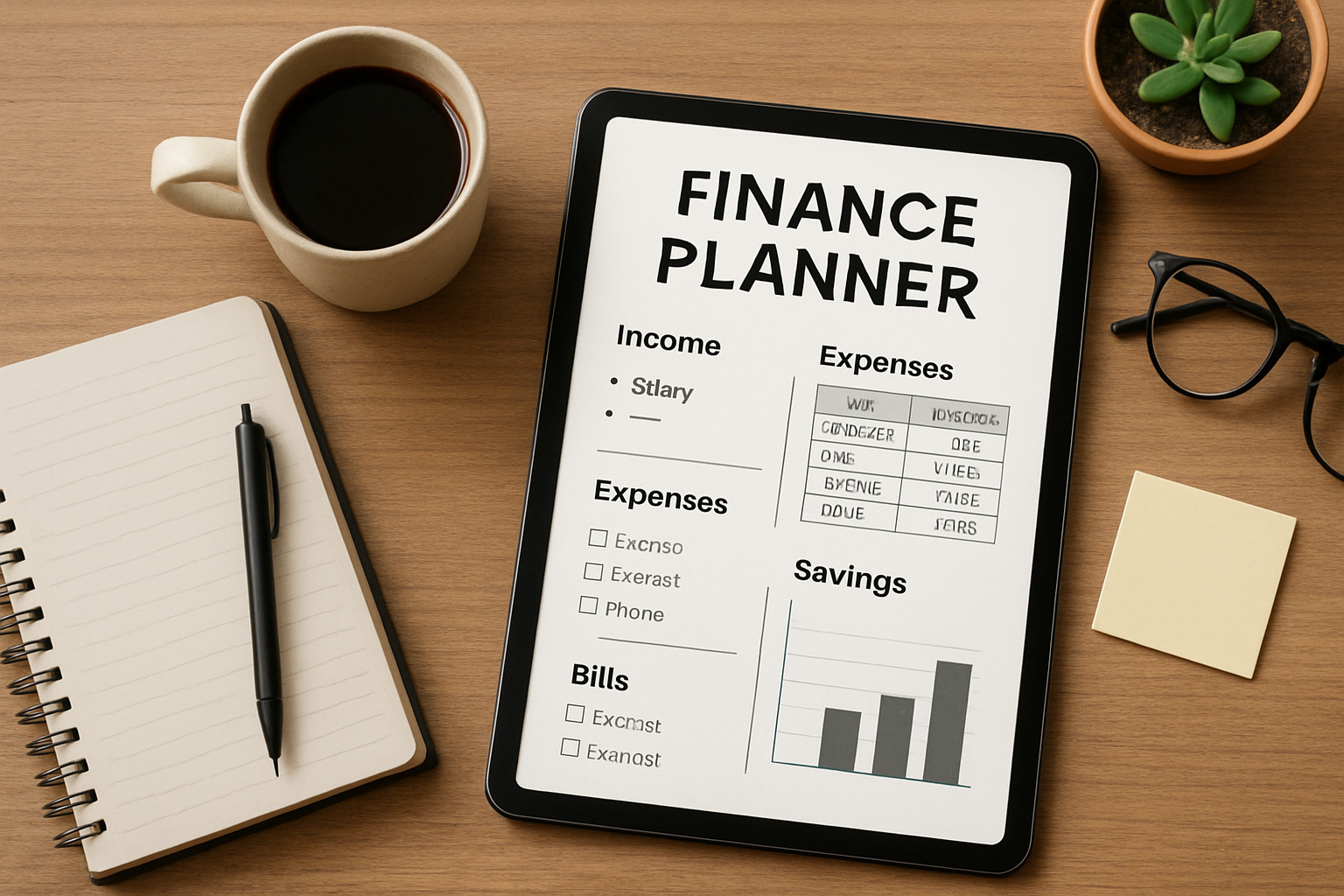Why Notion is Becoming the Go-To Choice for Finance Planning
A finance planner notion workspace lets you replace half-a-dozen finance tools with one flexible dashboard. In a single page you can:
- Track budgets that recalculate automatically
- Categorise expenses with rules like 50/30/20
- Monitor investments and net-worth in real time
- Plan debt-payoff and savings goals side-by-side
- Receive reminders for bills and subscriptions
Most readers tell us spreadsheets feel brittle and cluttered. Notion fixes that with interconnected databases, custom formulas and visual dashboards that update everywhere the moment you add a transaction. Everything lives in one placea true command centre for your money.

Why Switch from Spreadsheets to Notion?
Traditional spreadsheets lock you into rigid rows and columns. A finance planner notion setup, by contrast, gives you linked databases, drag-and-drop views, and progress bars that refresh instantly. It feels more like an app than a sheet.
| Feature | Excel/Sheets | Notion |
|---|---|---|
| Database links | Manual | Automatic |
| Mobile use | Limited | Full app |
| Dashboards | Static charts | Live widgets |
| Collaboration | Version conflicts | Real-time |
| Setup time | Formula heavy | 1-click template |
That flexibility saves serious time. Many users who spent 30min a week tidying multiple sheets now finish updates in under 10min because everythingbudget, debts, investmentsis centralised.
Cost & Learning Curve
Notions free personal plan already includes relations, formulas and unlimited pages. Duplicate a proven template, tweak the categories, and youre ready. A short evening of setup pays back every month you arent paying $10–$15 for a dedicated app.
Setting Up Your Finance Planner Notion Workspace

A solid system needs only four core databases:
- Accounts – checking, savings, credit cards, brokerage
- Transactions – every inflow/outflow
- Categories – Needs, Wants, Savings (edit as you like)
- Goals – emergency fund, debt-free date, investments
Link transactions to both an account and a category. Notion roll-ups then update balances, budgets and goal progress automatically.
Choose a Time-Saving Template
Start fast by duplicating this proven template. It comes with pre-built formulas, mobile quick-add buttons and optional multi-currency support. Customise later rather than reinventing everything on day one.
Tailor to Your Life
- Apply the 50/30/20 rule with simple formulas that compare each categorys spend to its target.
- Keep category lists short; you can always add detail when patterns emerge.
- Create template buttons for frequent spends (e.g. “Coffee $4 ☕️”) so logging takes five seconds on your phone.
Essential Features of a Modern Finance Planner Notion Template
Think of your finance planner notion template as the command center for your financial life. The best templates don’t just track numbers – they tell the story of your money and help you make smarter decisions.
A truly effective template needs to handle everything from your morning coffee purchase to your retirement contributions. Income tracking should capture not just your salary, but freelance work, investment dividends, and that side hustle you’ve been building. The magic happens when you can categorize these different income streams and see which ones are growing over time.
Expense tracking goes beyond simple logging. Modern templates let you upload receipt photos, tag expenses for tax purposes, and even set up alerts when you’re approaching budget limits. One user mentioned how their template helped them realize they were spending $400 a month on subscription services they’d forgotten about.
Your budget tracker becomes your financial GPS, showing exactly where you are versus where you planned to be. Progress bars make it visual – you can instantly see that you’ve used 80% of your dining budget but only 40% of your entertainment budget for the month.
Savings goals transform from wishful thinking into concrete targets with deadlines. Whether you’re building an emergency fund or saving for a vacation, seeing that progress bar inch toward 100% keeps you motivated on tough days.
Debt tracking might not be fun, but it’s incredibly powerful when done right. The best templates calculate payoff timelines, show you how extra payments accelerate your freedom date, and help you decide between the debt snowball and avalanche methods.
Investment monitoring keeps you connected to your long-term wealth building without obsessing over daily market swings. Track your portfolio performance, contribution schedules, and asset allocation all in one place.
Don’t underestimate subscription reminders – they’re financial lifesavers. With the average person having 12+ recurring subscriptions, automated alerts before renewal dates can save hundreds of dollars annually.
Your net worth calculator ties everything together, updating automatically as you log transactions and investment changes. Watching this number grow over time becomes incredibly motivating.
For deeper budgeting strategies that complement your Notion setup, our comprehensive budget worksheet provides frameworks that work beautifully alongside these digital tools.
Must-Have Databases & Automations
The transaction database serves as your financial diary, capturing every dollar that flows in and out of your life. Smart templates use formulas to recognize patterns – when you enter “Starbucks” for the third time, it automatically suggests the “Dining Out” category and pulls the location from your previous entries.
Your accounts database becomes a real-time snapshot of your financial world. Instead of logging into five different bank websites, you see all your balances in one place. The rollup formulas do the math automatically, so your checking account balance updates the moment you log a grocery store purchase.
Recurring entries handle the predictable parts of your financial life. Your rent, phone bill, and Netflix subscription get logged automatically on their due dates. This prevents the frustration of wondering why your budget looks off mid-month – those recurring expenses are already accounted for.
Reminder systems act like a gentle financial assistant. Bills due in the next week appear highlighted in red. Subscription renewals get flagged 30 days early. Your quarterly investment contributions get a friendly nudge when it’s time to act.
The beauty lies in how these databases talk to each other. Log one coffee purchase, and your expense tracker, budget monitor, account balance, and monthly report all update instantly.
Visual Reports & Dashboards

Your monthly reports should feel like getting a friendly financial checkup rather than a scary audit. The best dashboards show your income versus expenses in a way that makes sense at a glance. You want to open your template and immediately know whether you’re winning or need to course-correct.
Budget performance by category reveals your spending personality. Maybe you’re disciplined with groceries but struggle with online shopping. These insights help you focus your attention where it matters most.
Yearly insights become invaluable during tax season and annual planning. Your template can automatically flag business expenses, charitable donations, and investment gains throughout the year. No more scrambling through receipts in March.
KPI widgets turn complex financial concepts into simple metrics. Your emergency fund shows “4.2 months of expenses covered” instead of just a dollar amount. Your debt-to-income ratio displays as a clear percentage with color coding – green for healthy, yellow for caution, red for action needed.
The goal is creating a dashboard that motivates rather than overwhelms. Research shows that templates with too many flashy elements actually reduce usage over time. Focus on the metrics that drive better decisions, and your finance planner notion becomes a tool you’ll actually want to use every day.
Automating & Visualizing Your Money in Notion

Even without native bank feeds you can lighten data entry:
- Zapier: pipe PayPal, Stripe or CSV exports straight into your Transactions database.
- Recurring generators: auto-create rent, salary and subscription rows on schedule.
- Smart reminders: Notion filters can flag bills due in 7 days or categories nearing their limit.
Simple, Motivating Visuals
Progress bars often beat fancy charts. Still need deeper visuals? Feed a view into Google Charts and embed a live pie or line graphno code required.
Security Basics
Notion uses 256-bit TLS encryption and supports 2FA. Export your workspace monthly and avoid storing full account numbers; nicknames are enough for clear tracking.
Pros, Cons, and Best Practices
Pros
- All finances in one dashboard
- Visual progress tracking boosts motivation
- Free plan keeps costs at zero
- Endless customisation without code
Cons
- Manual entry unless you automate with Zapier/CSV
- Very large datasets can slow down
- Mobile input is good but not instant-sync like bank-linked apps
Best Practices
- Start simple – income + expense tracking. Layer on investments or debt later.
- Set a weekly review ritual – consistency matters more than frequency.
- Keep formulas readable – if you cant explain it, simplify it.
- Back up monthly – File → Export keeps your history safe.
When a Dedicated App Wins
If automatic bank sync, complex forecasting or heavy offline work are non-negotiable, a purpose-built finance app may suit you better. Otherwise, a focused finance planner notion setup offers best flexibility for the price.
Frequently Asked Questions about Finance Planner Notion
Can a finance planner notion track investments, debts, and subscriptions?
Absolutely! A well-designed finance planner notion template handles all these financial areas beautifully. Think of it as your personal financial command center where everything connects.
Investment tracking becomes surprisingly powerful in Notion. You can categorize your assets by type, calculate gains and losses automatically, and monitor your overall portfolio performance. Many users embed real-time stock and crypto widgets that update throughout the day, giving you live market data right in your dashboard.
The debt tracking features often become users’ favorite part. You can prioritize debts by interest rate, watch automatic payoff timeline calculations, and see visual progress bars shrink as you make payments. There’s something incredibly motivating about watching a countdown timer tick down to your debt-free date!
Subscription management might save you the most money immediately. Your template can track billing dates, send renewal reminders, and analyze your total recurring costs. Many people find they’re spending hundreds more per month on subscriptions than they realized – and that’s money you can redirect toward your financial goals.
Are Notion finance templates secure for sensitive data?
Security is naturally a top concern when managing financial information digitally. Notion provides bank-level protection with 256-bit TLS encryption and SHA-2 ciphers for all data transmission. Your information travels as securely as it would to your actual bank.
That said, smart users follow some common-sense security practices. Enable two-factor authentication on your Notion account – it takes two minutes and adds tremendous protection. Limit sharing permissions on your financial workspace to only people who truly need access. Update your password regularly, and never share financial templates publicly with real data included.
Here’s a practical tip: avoid storing complete account numbers or passwords directly in Notion. You can reference accounts by nickname or partial numbers. This way, even if someone gained access, they couldn’t immediately use your financial information.
Is Notion suitable for small-business finances as well as personal?
Many entrepreneurs find that finance planner notion templates work beautifully for small business finances. The flexibility that makes Notion great for personal use becomes even more valuable when you need customized business reporting.
Business-focused features can include client income tracking, invoicing management, and business expense categorization that makes tax time much easier. You can generate profit and loss reports, forecast cash flow, and calculate important expense ratios – all automatically updated as you enter daily transactions.
The real advantage for small businesses is customization. While standard accounting software forces you into rigid categories, Notion adapts to how your business actually works. Whether you’re a freelancer tracking project income or a small retailer managing inventory costs, you can build exactly what you need.
For business owners looking to expand their financial planning knowledge, our business financial planning section offers additional strategies that complement your Notion setup perfectly.
The bottom line? Whether you’re managing personal finances or running a small business, Notion’s flexibility makes it an excellent choice for people who want control over their financial tracking without the complexity of enterprise software.
Conclusion
Your journey with a finance planner notion system doesn’t have to be overwhelming. Think of it as building a financial command center that grows with you – starting simple and becoming more sophisticated as your confidence builds.
The beauty of Notion lies in its ability to adapt to your unique financial situation. Whether you’re tracking a simple budget or managing complex investments across multiple currencies, the same flexible foundation can handle it all. You’re not locked into someone else’s idea of how your money should be organized.
Getting started is easier than you might think. Begin by choosing a template that feels manageable – not the most feature-packed option, but one that matches where you are right now. Set up your basic accounts and start logging transactions for just one week. You’ll quickly see patterns emerge and understand what additional features would actually help you.
The numbers tell a compelling story. With over 10,000+ users successfully managing their finances through Notion templates and 91% giving these systems 5-star ratings, you’re joining a proven approach. These aren’t just statistics – they represent real people who’ve found clarity in their financial lives.
Consistency beats complexity every time. A simple system you use daily will serve you far better than an elaborate setup that intimidates you into avoidance. Start with tracking expenses and income, then gradually add savings goals, debt tracking, or investment monitoring as these become relevant to your situation.
At Finances 4You, we’ve seen how the right tools can transform financial stress into financial confidence. Our focus on helping individuals align their net worth with their age group becomes much easier when you have clear, organized data about where your money actually goes each month.
The most successful finance planner notion users share one trait: they view their system as a living document that evolves. Your financial life will change – new jobs, relationships, goals, and challenges will emerge. The flexibility to adapt your tracking system alongside these changes is invaluable.
Your future self will thank you for starting today, even if you begin with just the basics. Take that first step, duplicate a template, and start building the financial clarity you deserve.
Finance planner notion vocabulary:





